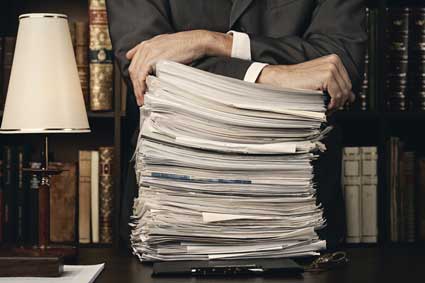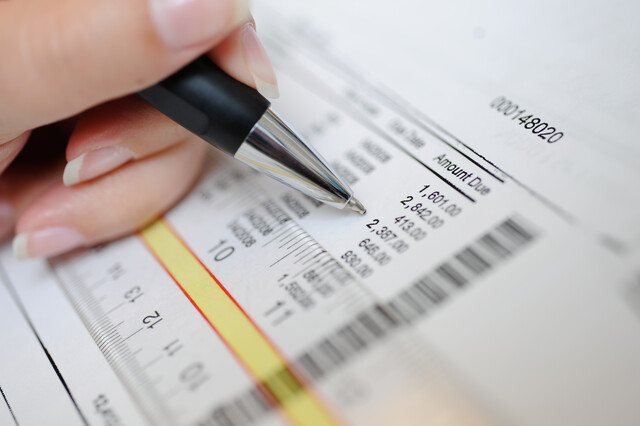Along with the other aspects of your job, a large part of being a legal secretary is creating typed correspondence throughout the day. The most common method of getting data from an attorney to secretary, in most offices, is via the use of a transcription device. Some offices still use shorthand, but most do not. Other methods include the attorney writing down the essentials of what is needed on a legal pad or blank form. Editing is a very important part of any secretarial position, particularly in the legal field. You would be hard pressed to find an attorney who is not a stickler for perfect or nearly perfect editing, grammar, and spelling. This article will cover various aspects concerned with legal correspondence, including getting signatures, addressing judges and clerks, and dealing with business letters. Be sure to pay special attention to the information offered there.
Because of the efficiency, speed, and ease of using transcription over other methods, it has become the standard in the legal field.
The system essentially works this way:
The attorney records a day's worth or several days' worth of documents into a handheld recorder with a removable tape. The attorney includes names, courts, cases, motions of various types, and all relevant information before each new document to be typed. The tape is then handed over to the secretary, who uses a tape player with a headset. As the secretary goes through the tape, she types each document in turn and completes the day's worth of work. When finished, she places the tape in a "done" bin and proceeds with the editing and printing of each document. These are then given to the attorney for review. The attorney will sign off on those that are ready for sending, edit or add information to those that need it, and return this pile to the secretary. If nothing has been missed or misinterpreted and the attorney no longer needs that tape, the secretary will then erase it by sliding it under a magnetic tape eraser. It may then be rewound and placed into the "blank" tape bin.
- If you cannot understand something the attorney said on the tape, even after replaying it multiple times, ask him or her to clarify.
- Double check any names you are unsure about for proper spelling in your address book or municipal law book.
- Never erase a tape until all documents on it have been approved and prepared for sending.
- Be sure to label your tape bins clearly and keep the incoming bin on the opposite side of your desk from your completed and erased bins; this avoids tape mix-up accidents.
- Keep recorder batteries and fresh tapes handy at all times.
- For very long documents, information may be recorded onto two or more tapes; be sure to keep these together by securing them together with an elastic band.
- You may receive several tapes in one day. Since tapes come with only one top label and are re-used multiple times, small post-it notes make great temporary "labels" for reminding you of the case or date of each tape.
The type of recorder, headset, and player may vary from attorney to attorney, but the procedure is essentially the same. If you do not have experience with this system, do not worry too much about getting the process down perfectly. You will become more adept at this process with practice and as you learn your particular attorney's style, voice cues, and way of recording. If you so desire, you can rent, borrow, or purchase a recorder and practice typing recorded data.
Editing is a vital part of a legal secretary's position and should be taken very seriously; thus, some basic editing tips are included here. We will cover resources that are available that will help you become a top-notch editor.
Most of us who use a word-processing program with any regularity have become accustomed to relying on the spell-check feature to catch certain errors. However, it would be a huge mistake to allow this feature to serve as your only means of editing a legal document. Spell-check does not catch all spelling errors because a word in question might be spelled correctly but still be incorrect in usage. For example, find the error in this sentence: "The cap was filled to the brim with fragrant, steaming hot coffee." Cap is spelled correctly, so the spell-check function would not understand that the writer meant to use the word "cup." Additionally, a computer spelling check cannot check proper names for you, so double check those yourself.
Editing may seem like a time-consuming part of your job, but it ultimately will save time in the long run. Editing entails reading the document over, top to bottom, and looking for mistakes in spelling, grammar, punctuation, and typing that may be present in the document. Editing thoroughly before printing is extremely important. If you miss a mistake, it is guaranteed that your attorney will catch it and you will have to correct the error and reprint the document before she or he will sign it or let you prepare it for delivery. To err is human; however, too many errors and your attorney will become frustrated. This will do nothing for your career and may even cost you a good reference or your job. Edit, edit, and edit again before printing anything. Edit one last time after printing and handing the document over to your boss.
If you have an office or cubicle buddy, see if you can set up a reciprocal editing partnership with her or him. Offer to do a last double check of your office buddy's documents before she or he hands them over to the boss, and vice versa. This often helps because when typing very large documents that have been edited and changed multiple times, a fresh eye will see errors that often are missed through overexposure. Be prepared to make multiple changes to any given document after it has been looked over by your boss, particularly during the draft stages of preparation; and be aware that you must perform an edit check for spelling, grammar, and typos before printing for each and every draft. This is a vital part of your job. It is embarrassing for an attorney to send out documents with errors; it makes the attorney look bad and makes you appear incompetent. Therefore, edit, edit, edit, and edit one last time; your boss will greatly appreciate you for it.
A note about editing and your resume: Your resume and cover letter will be your first introduction to the attorney or firm you are interested in working for. Because of this, be sure that both are exceptionally well-written and scrupulously edited. One mistake may be reason enough for a firm to reject you and select another candidate. Yes, editing is that important to attorneys!
In all correspondence to judges, cover letters and envelopes should be addressed this way: The Honorable John J. Jones, Justice, Appellate Division (or whatever division the judge represents), Supreme Court of the State of X, followed by the address. The salutation should read, "Dear Judge Jones." Names you are not sure of should always be double checked for proper spelling.
In all correspondence to clerks, cover letters and envelopes should be addressed as follows: Clerk of The Appellate Division (or whatever division they represent), then the address of the court. The salutation should read "Dear Sir or Madam." You may often have to include a self-addressed, stamped envelope (SASE) when sending filings to a court clerk. This gives the clerk a convenient method of sending copies stamped "filed" back to you. Be sure to add this item to your number of enclosures, and do not forget to stamp the envelope. Getting filings without a pre-stamped SASE is a peeve of most clerks.
If you are ever unsure about the appropriate fees or number of additional copies that must be provided with any given document, and cannot find this information in your municipal book, call the clerk's office and ask. Clerks are quite used to answering these questions; and as long as you are polite about it, they will be more than happy to tell you what you need to know. It often helps to keep track of fees and copies as you discover them. Type this information in your computer, or write it down on a legal pad or notebook. That way you have to ask only once.
Other Business Letters
Letters are usually left-aligned in the block style in legal offices. Be sure to always check names and addresses before sending anything out. Also, make sure to make a copy of the signed letter for the folder, no matter how insignificant it may seem. As with all outgoing correspondence, letters should be edited thoroughly. You may have occasion to sign minor, non-legal letters for your attorney while he or she is in court or out for the day, but be sure that this is a practice that is approved by your boss before taking the initiative on it. You may also be asked to draft letters yourself when your attorney is not able to do so.
Typing all varieties of correspondence is a large part of a legal secretary's duties. Be sure to check the spelling of all proper names and include the correct address and postage. If you must include a SASE (which will be mentioned in the cover letter), do not forget to add it to the bundle you are sending. Editing may be the most important skill you have when dealing with correspondence. Be sure to edit all documents with a keen eye to making them as nearly perfect as possible. This cannot be overstated: Attorneys simply are stringent about this part of documentation. If they catch an error, they will call you on it, If they catch many errors, it could cost you your job.
Indispensable Legal Secretary Aids
Aside from the other tools of the trade mentioned throughout this course, there are a few special items that will make the difference between being a good legal secretary and a great legal secretary. As mentioned, being a crack editor is an esteemed skill in the eyes of any attorney, so you should do all you can to develop this skill. There are several other tools that you will find to be indispensable in getting the job done quickly and accurately. This article describes these tools in greater detail and gives you some tips on using them properly. Keep them within arm's reach and make use of them frequently. They will be important for helping develop your skills. Finally, stress is sometimes part of the legal profession as well. With that in mind, we offer some tips and tools for keeping your stress level low and your job satisfaction level high.
Black's Law Dictionary
This bible of law was created by Henry Campbell Black in 1891. It has since gone through multiple editions and transformations. It is the definitive guide book for legal terminology. The full version of this massive book is a bit pricey and unnecessary for your purposes. The pocket or abridged version is perfect for your daily needs and come with more reasonable price tags. Be sure to purchase the newest edition. You will use this book again and again as you learn about the field of law. In fact, if your goal is to eventually move into the area of paralegal work or you are thinking about attending law school at some point, the study of this book will be a great asset to you. Keep one in your desk drawer, and refer to it often.
Your municipal law reference book will be the most used guide on your desk. These are standard issue in any legal office. Inside you will find names, addresses, phone numbers, and a plethora of other information vital to your daily work. If you are unfamiliar with this tome, you should make a point of bringing it home the first week on the job to familiarize yourself with it. As new editions come out, you will be provided with them, so there is no need for you to purchase a copy. You will use it often throughout the day to check name spellings, for finding fees, to get clerks' addresses and phone numbers, to find addresses for opposing attorneys, and information for a multitude of other tasks. If Black's Law Dictionary is the lawyer's professional bible, then this big red book could be considered the legal secretary's professional bible. It is not uncommon to see these books filled with post-it notes for marking often-used pages. Another method is to use stick-on, colored tab dividers to mark pages you want to access quickly. Keep this one on your desk.
Two absolute musts for any secretary are a good dictionary and thesaurus. These two items should be in your possession at all times. If you are on a tight budget, you can pick up either of these at a used book store, a garage sale, or even at a local library's sale bin. You should make it a habit to look up any word you are not familiar with in the dictionary. Not only will this expand your vocabulary, but it will enhance your writing and editing skills tremendously. Thesauruses are valuable tools for finding alternate words when composing correspondence. Some of the best dictionaries and thesauruses you can purchase are The American Heritage Dictionary, Merriam-Webster's Collegiate Dictionary, The Oxford English Dictionary, or Oxford Thesaurus of English. Pocket or short versions of these are fine and most likely a better choice if you have a small working area. As with your Black's, keep them handy at all times.
This tiny, classic book by William Strunk, Jr., offers excellent advice on rules, usage, and style. It is a must for becoming an exceptional writer and editor. It is a small book, so read it through at least once and then keep it in your desk for reference.
Books that are nice to have but not essential:
The Elements of Legal Style
This book by Byran A. Garner was inspired by Strunk's classic. It is an excellent aid in mastering the proper style of legal writing.
Dictionary of Legal Terms
Written for the lay person, this is a simple and easy-to-understand collection of often used legal terms by Steven H. Gifis. You will find it perfect for quick look-ups.
Legal Secretary's Complete Handbook
This book by Mary A. DeVries is a good book to have for a general reference guide. It is not a must-have, but you will find useful information within the pages.
Legal Document Production
As mentioned in the introduction, this article is not just about books and writing tools. While being a legal secretary is a very rewarding career, it also can be very stressful. Some attorneys are calm and easygoing, but most are high-charged and dynamic; they can become quite intense when working on a tight schedule. Even if you enjoy the fast pace and constant activity of legal work, there are times that you may feel overwhelmed. If you work for a high-profile attorney, it will not be uncommon for you to be in the office late working on an important case for days on end. Even smaller firms come up against filing deadlines or urgent strategy situations frequently, which adds to the feeling of frenzy and tension for everyone.
Talk to any legal secretary and she or he will tell you what helps get the job done and makes the work as rewarding and stress-free as possible. For some it is those stress balls that one squeezes until feeling better; for others it is a picture of a loved one placed in the direct line of sight. As you progress in your career, you will find your own methods of dealing with stress and calming the nerves of frazzled bosses and co-workers. Until that time, here are some other tips, tools, and aids that you will find useful:
1. Maintain your sense of humor!
2. Keep an economy-sized bottle of headache medicine in your desk drawer.
3. Take a 10-minute walk around the office building.
4. If you have to work through lunch, make sure to take a break at some point in the day to recharge your mind.
5. When working late hours, remind yourself that once things settle down, you will get a well-deserved break.
6. Bring fruit or a healthy snack with you to keep your energy levels high.
7. If your boss is freaking out over a deadline, take a deep breath and do not say anything to fuel the fire.
8. Do not allow a hurried atmosphere to push you into making avoidable mistakes. Do the job right the first time, no matter how rushed. It will save time in the long run.
9. Form a friendship with a co-worker; a friendly chat can make the day go easier.
10. Do the best job you can and do not make yourself crazy over minor mistakes.
11. In even the most stressful situations, try to find a positive point of reference.

























